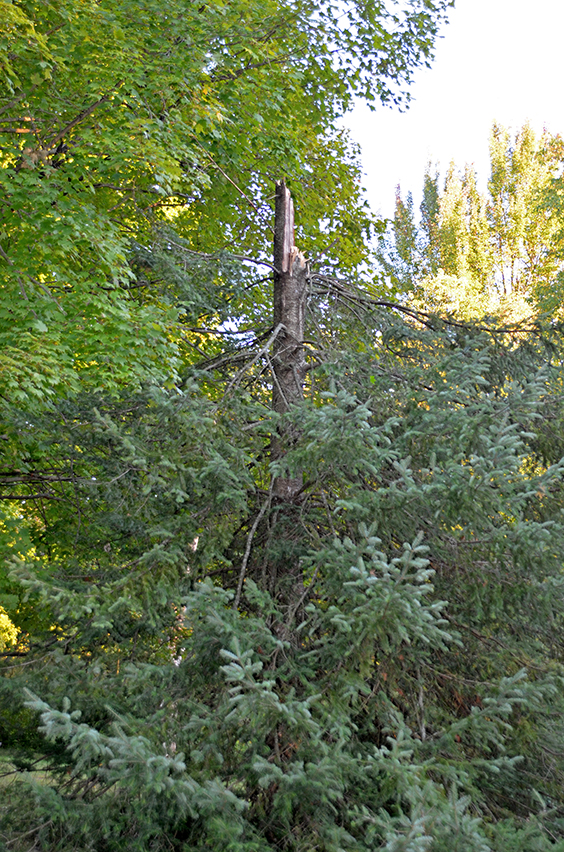Strong winds whipped trees to the breaking point throughout the Cedar Springs area causing great damage. Power outage hit much of Cedar Springs where homes were without electricity for 24 hours or longer.
Tiny insects like the Harvester butterfly survived. I saw one standing in its usual haunt on a following sunny day. My article in the November e-news will address the Harvester butterfly in detail.
At Ody Brook the top two thirds of a balsam fir in the yard was broken off. The tree was 30 feet tall. Now we wait to see if a branch will turn upward to replace the leader shoot. The tree was planted 35 years ago when my girls were young. We have pictures of them standing next to tree when they were taller than the tree. We experience loss when any friend dies. I try to be a good friend to the species living and sharing Ody Brook. Though I have documented less than a thousand species here, I expect the number could reach a few thousand with the wonderful variety of insects.
 There were ten locations with larger trees down across the trails that require chainsaw cutting to open the paths. Our mission is biodiversity enhancement at the sanctuary but we open our property for others to discover and learn. We have not charged for access to Ody Brook but donations are welcome for maintaining trails, signage and enhancing biodiversity. Wild Ones butterfly garden expansion and maintenance is greatly appreciated. Thank you.
There were ten locations with larger trees down across the trails that require chainsaw cutting to open the paths. Our mission is biodiversity enhancement at the sanctuary but we open our property for others to discover and learn. We have not charged for access to Ody Brook but donations are welcome for maintaining trails, signage and enhancing biodiversity. Wild Ones butterfly garden expansion and maintenance is greatly appreciated. Thank you.
Trees down on powerlines in Cedar Springs and in other communities is an immediate safety hazard and loss of power threatens cold food storage and at certain times of the year home warmth and pipe freezing. Trees on buildings might open roofs to weather elements and internal damage. Things could be worse.
The current fires in California, Oregon, Washington, and other western states dwarf our problems. The high magnitude hurricanes coming off the Gulf of Mexico recently devastated communities to a greater extent. Of course, we focus on our own local problems but we should recognize we are generating global problems through Anthropocene behavior. Rapid consumption of fossil fuels by humans is causing climate change. It is causing self-induced problems, financial expense, and loss of lives and livelihoods for people and wildlife.
Changing from fossil energy fuels to alternative solar and wind energy is a reasoned moderation with positive direction for present and future generations of people, wildlife and plant community nature niches. It will provide increased employment, improve the economy, and stabilize community social wellbeing. It will require a change in attitude and behavior for those wanting to keep things the same. Without change we allow living conditions to deteriorate for both present and future generations of people and other life.
Trees down in communities by severe storms is symptomatic of global problems we are worsening by not proactively addressing climate changing behavior. We can increase employment by changing from fossil fuel use, improve the economy, help humans stave off self-generated life-threating problems, and be a solution that helps people and nature niches. Retraining worker livelihood skills from fossil fuel work to alternatives is good.
Dave Wagner and Weston Henry from the University of Connecticut recently concluded an article with “there is little doubt that the most important matters for those that value planetary biodiversity are to slow and mitigate climate change and the loss of tropical forests. These are the most urgent threats to butterflies and wildlife. We must dial back our use of fossil fuels, while simultaneously ramping up green energy technology and solutions.”
We can choose a healthier future, but it requires us to unite for positive actions and behavioral change.
Natural history questions or topic suggestions can be directed to Ranger Steve (Mueller) at [email protected]– Ody Brook Nature Sanctuary, 13010 Northland Dr. Cedar Springs, MI 49319 or call 616-696-1753.

